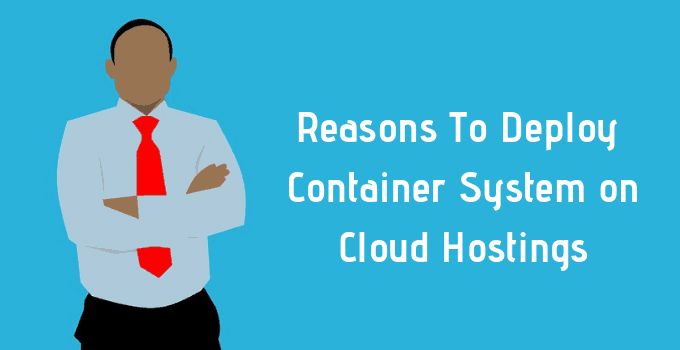As an enterprise, reaching business goals in time is a top priority. To hit this target, most organizations evaluate and create metrics that can help them get into the momentum. In most cases, it begins with updating tools and software that carry workloads whereas in some cases it starts with cutting costs and redundant applications. That being said, a trend that is catching up with organizations of all sizes when it comes to managing workloads and applications is container system deployment. This system is deployed after getting hands on the best cloud hosting supplier or facilitator to further boost IT efficiency. We probed further and came across five distinct factors that are making container systems a favourite while hosting apps on the cloud. Let us deep dive and have a look, shall we?
5 Reasons To Deploy Container System on Cloud Hostings

Reasons To Deploy Container System on Cloud Hostings
1. Provides consistency across environments
Container systems allow decoupling of applications. Meaning, the applications that are hosted in your IT environment can be separated. This isolated approach provided by container systems allows applications to run with much more efficiency and raise their standards of productivity. Since these applications manage workloads effectively in container systems, their impact can be seen on the productivity of employees. Understand that this is a key highlight provided by container systems consistently not only across the best cloud hosting environments but also across on-premise and hybrid cloud simulations.
2. Boosts productivity of employees
As we brushed this topic in the previous paragraph, allow us to tell you how container systems accelerate productivity in the workplace. Container systems totally remove the dependency of your workforce on time-consuming activities such as application debugging, software deployment issues and app version configurations. In fact, with container-based applications facilitated by the best Cloud Hosting, your employees can focus on business goals that can reduce the time to value your product for your customers. This impacts growth, profitability and in turn boosts the productivity of employees.
3. Serves as a replicable model
For applications that are integrated with container systems, replication is quite easy. Understand this: container systems are nothing but self-contained packages that can be deployed away from the code, operating system and machines. Hence, what remains of the container system is nothing but a smaller package that can be moved to other platforms and environments easily. This flexibility has allowed container systems to be scaled and replicated across some of the best Cloud Hosting environments. To supplement this, this platform independence has made containers a favourite amongst SMB as well as DevOps communities.
4. Facilitates security in a unique manner
You have already read above that container systems allow applications to be separated consistently across the IT or cloud environment. This separation means container systems do not interact with each other only to secure their activity and protect the application from virus attacks. If at all the container gets attacked, which happens unless it is protected by cyber threat detection tools or products, the applications in other containers do not get affected. That is, they do not stop operating. Also, if the applications in the container system are attacked, the application can be contained. As in, you can stop the application that is running at a speed in one container without hampering the speed of the entire container series. Sounds like a huge benefit, right?
5. Elevates the agility component in an IT environment
The decoupling of container systems is a benefit in many ways. For one, it keeps containers secure, as mentioned above. Two, it provides consistency across the environment. And three, it provides agility in terms of managing the applications and updates. Isolation of applications in the best Cloud Hosting environment further elevates the agility of the application in the environment. Since the speed of the application in one container is independent of the speed of another application in a different container, any application can run smoothly without any disturbance.
Is this all?
Not really. Container systems have many other advantages when it comes to the orchestration of applications in the best cloud hosting environments. Any enterprise can integrate container systems into their hosting environment and add plugins to boost the security of these containers. In addition to the ones mentioned, containers can be created, replicated and destroyed in a matter of seconds. They give massive operational efficiencies to its deployers and improve the productivity of developers working across small, medium and large enterprises while moving to the cloud.
We hope that you have enjoyed reading this article about container systems and the benefits they hold for enterprises of all shapes and sizes. If you have any feedback for us, please leave the same in the comments section below.

